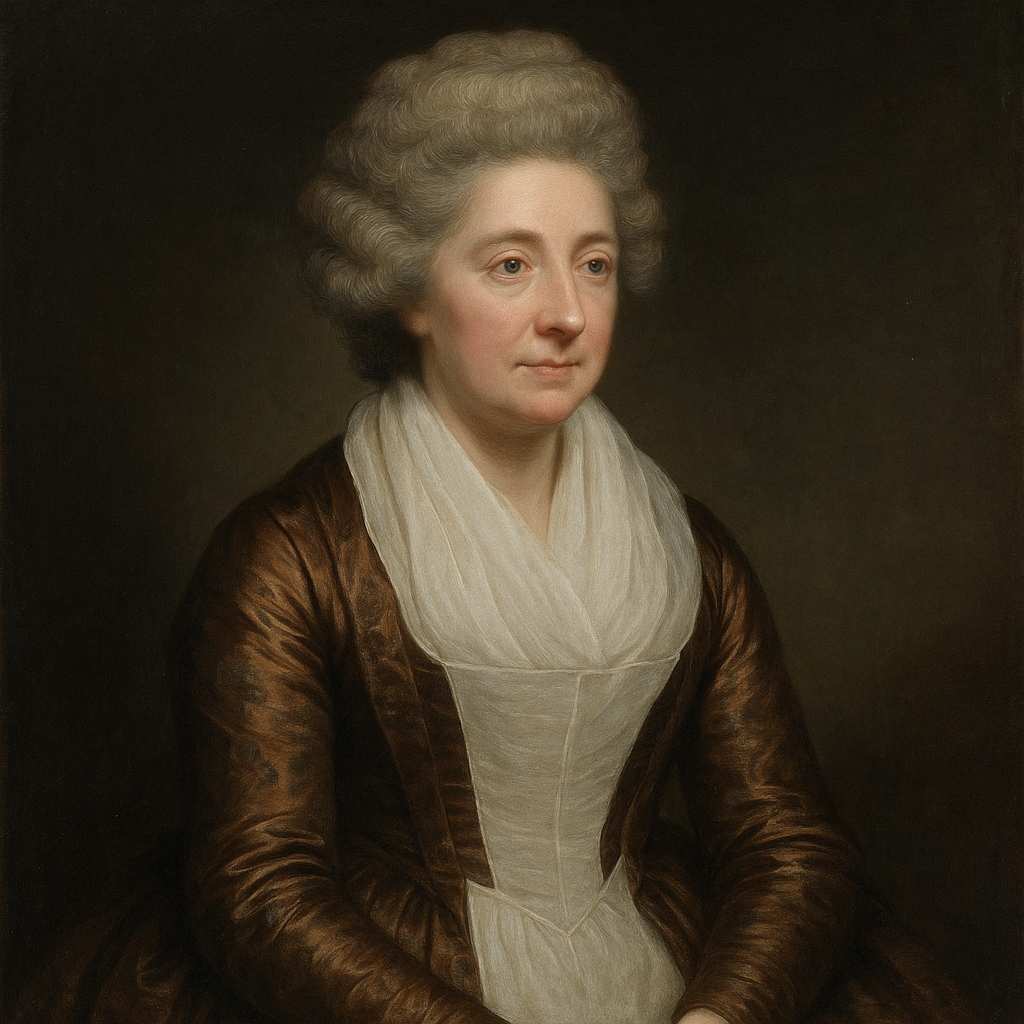To a Little Invisible Being
Anna Lætitia Barbauld
1743 to 1825

Germ of new life, whose powers expanding slow
For many a moon their full perfection wait,—
Haste, precious pledge of happy love, to go
Auspicious borne through life's mysterious gate.
What powers lie folded in thy curious frame,—
Senses from objects locked, and mind from thought!
How little canst thou guess thy lofty claim
To grasp at all the worlds the Almighty wrought!
And see, the genial season's warmth to share,
Fresh younglings shoot, and opening roses glow!
Swarms of new life exulting fill the air,—
Haste, infant bud of being, haste to blow!
For thee the nurse prepares her lulling songs,
The eager matrons count the lingering day;
But far the most thy anxious parent longs
On thy soft cheek a mother's kiss to lay.
She only asks to lay her burden down,
That her glad arms that burden may resume;
And nature's sharpest pangs her wishes crown,
That free thee living from thy living tomb.
She longs to fold to her maternal breast
Part of herself, yet to herself unknown;
To see and to salute the stranger guest,
Fed with her life through many a tedious moon.
Come, reap thy rich inheritance of love!
Bask in the fondness of a Mother's eye!
Nor wit nor eloquence her heart shall move
Like the first accents of thy feeble cry.
Haste, little captive, burst thy prison doors!
Launch on the living world, and spring to light!
Nature for thee displays her various stores,
Opens her thousand inlets of delight.
If charmed verse or muttered prayers had power,
With favouring spells to speed thee on thy way,
Anxious I'd bid my beads each passing hour,
Till thy wished smile thy mother's pangs o'erpay.
Anna Lætitia Barbauld's To a Little Invisible Being
Anna Lætitia Barbauld’s poem "To a Little Invisible Being Who is Expected Soon to Become Visible" is a tender meditation on the imminence of birth and the profound mysteries of new life. Written in the late 18th or early 19th century, the poem is emblematic of Barbauld’s ability to interweave emotional intimacy with philosophical reflection. Through its use of apostrophe, vivid imagery, and a contemplative tone, the poem speaks to universal themes of anticipation, maternal love, and the miracle of creation.
Structure and Form
The poem consists of eight stanzas of four lines each, written in iambic pentameter with a consistent ABAB rhyme scheme. This regularity reflects the natural order and inevitability of the life cycle, reinforcing the thematic underpinnings of continuity and progression. The gentle rhythm mirrors the calm yet hopeful anticipation of the speaker.
Close Reading and Interpretation
Stanza 1
Germ of new life, whose powers expanding slow
For many a moon their full perfection wait,—
Haste, precious pledge of happy love, to go
Auspicious borne through life's mysterious gate.
The opening stanza introduces the "invisible being" through the metaphor of a "germ of new life," emphasizing its potential and latent energy. The phrase "expanding slow" reflects the gradual process of gestation, underscoring the patience required for this transformation. The "precious pledge of happy love" suggests that the child represents the physical and emotional bond between parents, while the "mysterious gate" alludes to both the uncertainty and promise of birth.
Stanza 2
What powers lie folded in thy curious frame,—
Senses from objects locked, and mind from thought!
How little canst thou guess thy lofty claim
To grasp at all the worlds the Almighty wrought!
Here, Barbauld marvels at the potential contained within the unborn child. The "curious frame" conveys the intricate and enigmatic nature of human life, while the juxtaposition of "senses from objects locked" and "mind from thought" emphasizes the untapped capacity of the infant. The reference to the "Almighty" situates the child within a divine framework, suggesting that its existence is both miraculous and cosmically significant.
Stanza 3
And see, the genial season's warmth to share,
Fresh younglings shoot, and opening roses glow!
Swarms of new life exulting fill the air,—
Haste, infant bud of being, haste to blow!
This stanza links the child’s imminent arrival to the natural cycles of renewal and growth. The imagery of "opening roses" and "swarms of new life" aligns human reproduction with the fecundity of spring, portraying birth as part of a universal celebration of life. The repeated exhortation to "haste" conveys the speaker's impatience and excitement.
Stanza 4
For thee the nurse prepares her lulling songs,
The eager matrons count the lingering day;
But far the most thy anxious parent longs
On thy soft cheek a mother's kiss to lay.
The focus narrows to the immediate human context, depicting the anticipation of the caregivers. The image of the mother, central to this stanza, captures the emotional intensity of her longing. The "lingering day" underscores the slow passage of time, heightened by maternal anticipation.
Stanza 5
She only asks to lay her burden down,
That her glad arms that burden may resume;
And nature's sharpest pangs her wishes crown,
That free thee living from thy living tomb.
Here, Barbauld contrasts the physical suffering of childbirth with the joy it brings. The paradox of laying down the "burden" only to "resume" it reflects the deep bond between mother and child, where pain is willingly endured for the sake of love. The "living tomb" metaphor poignantly captures the womb as both a shelter and a temporary confinement.
Stanza 6
She longs to fold to her maternal breast
Part of herself, yet to herself unknown;
To see and to salute the stranger guest,
Fed with her life through many a tedious moon.
The child is described as "part of herself, yet to herself unknown," encapsulating the duality of motherhood: the child is both an extension of the mother and an independent being. The "stranger guest" phrase underscores the mystery and novelty of new life, while "tedious moon" reinforces the prolonged waiting of pregnancy.
Stanza 7
Come, reap thy rich inheritance of love!
Bask in the fondness of a Mother's eye!
Nor wit nor eloquence her heart shall move
Like the first accents of thy feeble cry.
This stanza celebrates the emotional rewards of motherhood, with the child’s "feeble cry" holding greater power than any intellectual or artistic achievement. The emphasis on "inheritance of love" underscores the idea that the child is born into a pre-existing reservoir of care and affection.
Stanza 8
Haste, little captive, burst thy prison doors!
Launch on the living world, and spring to light!
Nature for thee displays her various stores,
Opens her thousand inlets of delight.
The penultimate stanza is a triumphant call to life, urging the child to "burst thy prison doors" and embrace the sensory pleasures of the world. The imagery of "Nature’s stores" and "thousand inlets of delight" highlights the richness of experience awaiting the newborn, framing life as a journey of discovery and joy.
Stanza 9
If charmed verse or muttered prayers had power,
With favouring spells to speed thee on thy way,
Anxious I'd bid my beads each passing hour,
Till thy wished smile thy mother's pangs o'erpay.
The closing stanza shifts to a contemplative and devotional tone, emphasizing the speaker’s deep emotional investment in the safe arrival of the child. The speculative opening—“If charmed verse or muttered prayers had power”—conveys both the speaker’s helplessness and her wish to influence the natural process through supernatural or spiritual means. By imagining the efficacy of “charmed verse” and “favouring spells,” the speaker subtly elevates the poem itself to an act of reverent invocation, blending poetic creation with maternal devotion.
The imagery of “bidding beads” suggests not only religious devotion but also an urgency tied to time’s relentless passage, with the mother counting each moment until her longing is satisfied. This repetition underscores her emotional endurance during the wait. The phrase “thy mother’s pangs o’erpay” anchors the stanza in the ultimate consolation of the newborn’s presence, balancing the agony of childbirth with the anticipated joy of holding the child. The weight of “pang” reminds the reader of the physical and emotional cost of birth, while “o’erpay” frames the child’s first smile as more than sufficient compensation, highlighting the selflessness of maternal love.
This stanza acts as a final blessing, where maternal anxiety and hope are woven into a spiritual framework. While it lacks the triumph of earlier stanzas that focus on the marvels of life, it achieves a poignant, grounded resolution by centering on the personal and sacrificial dimensions of the maternal experience.
Themes
- Maternal Love and Anticipation: The poem vividly portrays the mother’s emotional investment in her child, encapsulating the blend of joy, longing, and sacrifice inherent in motherhood.
- Miracle of Creation: The "invisible being" symbolizes the wonder of life itself, as the speaker meditates on its untapped potential and divine origins.
- Nature and Renewal: By linking birth to natural cycles, Barbauld situates the human experience within the broader rhythms of the natural world.
Conclusion
Anna Lætitia Barbauld’s "To a Little Invisible Being Who is Expected Soon to Become Visible" is a richly textured meditation on the mysteries of birth and the profound emotional and philosophical dimensions of motherhood. Through its elegant structure, evocative imagery, and universal themes, the poem captures both the intimate and cosmic significance of new life, resonating deeply with readers across generations.
This text was generated by AI and is for reference only. Learn more
Want to join the discussion? Reopen or create a unique username to comment. No personal details required!



Comments
No comments yet. Be the first to comment!